SHORT TAKE:
The Empresses have no clothes. Not literally. But the only reason I can think it is receiving all its applause is because the cast is a bunch of women and it would be "politically incorrect" to do a fair review. Well, the poor male reviewers who are fearful of being labeled sexist may not want to say it, but I will. Ocean's 8 is a bad movie.
WARNING – MAJOR MAJOR SPOILERS AND ENDINGS – PICTURES AND DESCRIPTIONS – NOT ONLY OF OCEAN’S 8 BUT OF A NUMBER OF MOVIES OF THIS GENRE
You know, I was all set to like Ocean's 8. Never mind, as a rule, I don’t much care for the gender switching gimmick. I respect most of the work of the main actresses, really like a lot of the supporting cast, and enjoy this kind of complex Mission Impossible-type plot.
In the lead is Sandra Bullock (Debbie): as at home in comedy and drama as action adventure – 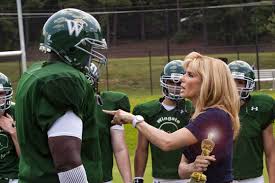 Blind Side, Miss Congeniality, Speed, Gravity, While You Were Sleeping; even kid movies like Prince of Egypt and Minions.
Blind Side, Miss Congeniality, Speed, Gravity, While You Were Sleeping; even kid movies like Prince of Egypt and Minions.
Cate Blanchett (Lou) whose versatility allowed her to become immersed in the roles of Galadriel from 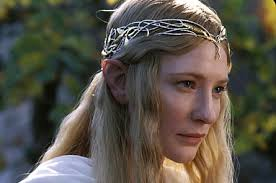 The Lord of the Ring series, the German art curator from Monuments Men, an almost sympathetic stepmother in Branagh's Cinderella, Button's wife in The Curious Case of Benjamin Button, appearances in off-oddities like Hot Fuzz and The Life Aquatic with Steve Zissou, Kevin Spacey’s insane wife in Shipping News, and Lady Gertrude Chilerton in The Ideal Husband.
The Lord of the Ring series, the German art curator from Monuments Men, an almost sympathetic stepmother in Branagh's Cinderella, Button's wife in The Curious Case of Benjamin Button, appearances in off-oddities like Hot Fuzz and The Life Aquatic with Steve Zissou, Kevin Spacey’s insane wife in Shipping News, and Lady Gertrude Chilerton in The Ideal Husband.
Then there’s Helen Bonham Carter (Rose): from Ophelia in Gibson’s Hamlet to Bellatrix Lestrange in the 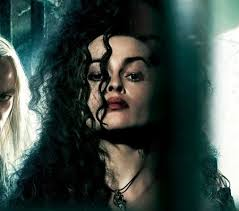 Harry Potter series to Mrs. Thenardier in the musical Les Mis and the homicidal assistant in Sweeney Todd, a chimp in Burton’s Planet of the Apes, the fairy godmother in the same Branagh Cinderella mentioned above, the gentle Queen Elizabeth in The King’s Speech and the manic Red Queen in Burton’s Alice in Wonderland – her repertorie is breathtaking.
Harry Potter series to Mrs. Thenardier in the musical Les Mis and the homicidal assistant in Sweeney Todd, a chimp in Burton’s Planet of the Apes, the fairy godmother in the same Branagh Cinderella mentioned above, the gentle Queen Elizabeth in The King’s Speech and the manic Red Queen in Burton’s Alice in Wonderland – her repertorie is breathtaking.
Anne Hathaway (Daphne), another incredibly versatile actress who was also in 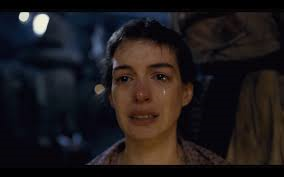 Les Mis, and Alice Through the Looking Glass, as well as Interstellar, Dark Knight Rises and Princess Diaries.
Les Mis, and Alice Through the Looking Glass, as well as Interstellar, Dark Knight Rises and Princess Diaries.
I’m starting to see a pattern. If I were to scatter the names of the main cast on a table and then draw a line between those who have worked together it would look like a spiderweb.
Then there’s the supporting cast including James Corden (John) 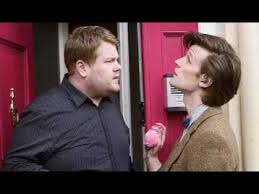 (Dr. Who repeat guest appearance and voice of Peter Rabbit) who plays the adorably inquisitive and very smart insurance inspector, and
(Dr. Who repeat guest appearance and voice of Peter Rabbit) who plays the adorably inquisitive and very smart insurance inspector, and  Richard Armitage (Claude) (from Captain America villain to the heroic and noble King Under the Mountain, Thorin Oakenshield from The Hobbit) who plays Debbie's ex-boyfriend, and
Richard Armitage (Claude) (from Captain America villain to the heroic and noble King Under the Mountain, Thorin Oakenshield from The Hobbit) who plays Debbie's ex-boyfriend, and  cameos from the likes of film veteran Elliott Gould reprising his previous role as Reuben from the male Ocean's versions, as well as Marlo Thomas, Dakota Fanning and Elizaberth Ashley.
cameos from the likes of film veteran Elliott Gould reprising his previous role as Reuben from the male Ocean's versions, as well as Marlo Thomas, Dakota Fanning and Elizaberth Ashley.
I mean – what’s not to like?
Well, unfortunately, a lot.
Ocean's 8 women ………….
are unrelatably immoral, violate the rules of the thief protagonist movie to the detriment of the genre and…… hate men.
The premise is that Debbie (Sandra Bullock) is the sister of Danny Ocean (founding lead of the Ocean's franchise, played by George Clooney who only appears as a photo). She has followed in his footsteps, but five years previously she placed her trust and love with a man, Claude (Richard Armitage) who betrayed and sent her to jail. For the money, the challenge and revenge she sets up a heist of jewels on loan and display at the Met Gala, a real annual $30,000 per ticket event. 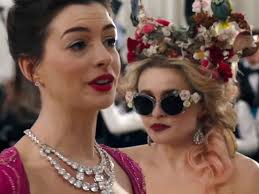 She plans to steal MILLIONS worth of sparklies from the ample busom of Daphne (Anne Hathaway), which display had been intended to help fund the museum for the year. Amongst the thieves there are no orphanages to fund, no granny operations to pay for, no nuns to receive charity. These con-women want to pay for pointlessly bad movies, start fashion businesses with terrible designs, buy overpriced studio apartments or just speed off into the sunset on their motorcycle presumably to live the rest of their lives carefree. In other words – they will steal from a legitimate charity donated to by generous and well intentioned hard working people in order to engage in a lifetime of exhorbitant self indulgence.
She plans to steal MILLIONS worth of sparklies from the ample busom of Daphne (Anne Hathaway), which display had been intended to help fund the museum for the year. Amongst the thieves there are no orphanages to fund, no granny operations to pay for, no nuns to receive charity. These con-women want to pay for pointlessly bad movies, start fashion businesses with terrible designs, buy overpriced studio apartments or just speed off into the sunset on their motorcycle presumably to live the rest of their lives carefree. In other words – they will steal from a legitimate charity donated to by generous and well intentioned hard working people in order to engage in a lifetime of exhorbitant self indulgence.
 Well, nice for them but what about the museum who will now have to account for the missing jewels in higher insurance premiums or perhaps the inability to get insurance at all? What about the taxpayers who no longer have the access to jewels they have paid to view, or the people whose jobs will likely now be forfeit or who will come under suspicion as a result of the disappearance and dismantling of the priceless historic finery. What's planned for the inevitable sequel? Cut up a Rembrandt into stamps in order to fund their respective future cocaine habits? And we are to applaud and sympathize with them as clever and daring just because they are………… women?????
Well, nice for them but what about the museum who will now have to account for the missing jewels in higher insurance premiums or perhaps the inability to get insurance at all? What about the taxpayers who no longer have the access to jewels they have paid to view, or the people whose jobs will likely now be forfeit or who will come under suspicion as a result of the disappearance and dismantling of the priceless historic finery. What's planned for the inevitable sequel? Cut up a Rembrandt into stamps in order to fund their respective future cocaine habits? And we are to applaud and sympathize with them as clever and daring just because they are………… women?????
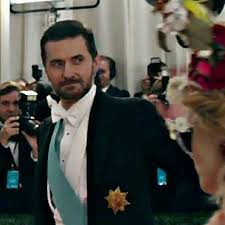 Except for the ex-boyfriend, Claude, there was no indication that any of the collaterally damaged people deserved what happened or will happen to them in any way. And as Debbie is no better than Claude she has no real grounds to set him up either.
Except for the ex-boyfriend, Claude, there was no indication that any of the collaterally damaged people deserved what happened or will happen to them in any way. And as Debbie is no better than Claude she has no real grounds to set him up either.
These women take advantage of others' virtues at every opportunity. 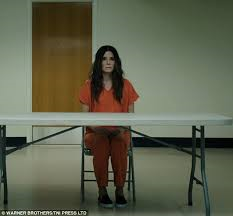 Debbie manipulates the mercy of the parole board into letting her out even though she has been running cons while in prison.
Debbie manipulates the mercy of the parole board into letting her out even though she has been running cons while in prison. 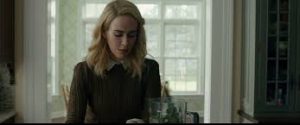 Tammy takes advantage of her poor unseen husband – lying to him and dumping the responsibilities of their home, children and family on to this unseen shlemiel so she can run off at a moment's notice to possibly end up in jail.
Tammy takes advantage of her poor unseen husband – lying to him and dumping the responsibilities of their home, children and family on to this unseen shlemiel so she can run off at a moment's notice to possibly end up in jail.  All of them take advantage of the charity work of the museum, the generosity of the donors,
All of them take advantage of the charity work of the museum, the generosity of the donors,  the good will of Cartier,
the good will of Cartier,  even the courtesy of the security guards assigned to the necklace. In return these people will get betrayal, retribution for their well intentioned mistakes, probably the loss of their careers, certainly the loss of reputation, loss of funds for the museum, the loss of irreplaceable works of art, AND the good will of us, the audience who are supposed to applaud the blatant vices of the characters in Ocean's 8.
even the courtesy of the security guards assigned to the necklace. In return these people will get betrayal, retribution for their well intentioned mistakes, probably the loss of their careers, certainly the loss of reputation, loss of funds for the museum, the loss of irreplaceable works of art, AND the good will of us, the audience who are supposed to applaud the blatant vices of the characters in Ocean's 8.
In most movies that feature thieves as the protagonists, there are usually one of three outcomes or a combination: they die, they get caught, they are "innocent" because they do it for a believable and good reason/it's a trick and they are not guilty:
WARNING: BEYOND HERE BE MASSIVE ENDING SPOILERS TO CLASSIC MOVIES
CLICK ON ANY OF THE PICTURES TO GO TO AMAZON AND WATCH ANY OF THESE FAR SUPERIOR FILMS INSTEAD OF OCEAN'S 8. NETFLIX WOULD PROBABLY HAVE MOST OF THEM TOO IF YOU HAVE A SUBSCRIPTION BECAUSE MANY ARE OLDER.
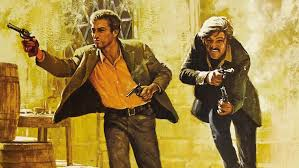 Butch Cassidy and the Sundance Kid – die in a hail of bullets courtesy of the Bolivian military
Butch Cassidy and the Sundance Kid – die in a hail of bullets courtesy of the Bolivian military
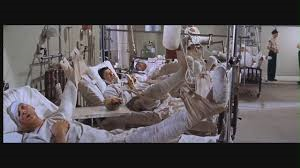 It’s a Mad Mad Mad Mad World – they all get physically pummeled by their own escape attempts, are caught, hospitalized, jailed and presumably will go to prison
It’s a Mad Mad Mad Mad World – they all get physically pummeled by their own escape attempts, are caught, hospitalized, jailed and presumably will go to prison
 Hell and High Water – they rob the banking insitution which robbed their widowed mother to get enough to rescue the family farm AND one of the brothers dies
Hell and High Water – they rob the banking insitution which robbed their widowed mother to get enough to rescue the family farm AND one of the brothers dies
 The Italian Job – they are left, literally, hanging over a precipice with their fates uncertain – to this day, even unknown to the makers of the movie (they were going to make a sequel but it never happened)
The Italian Job – they are left, literally, hanging over a precipice with their fates uncertain – to this day, even unknown to the makers of the movie (they were going to make a sequel but it never happened)
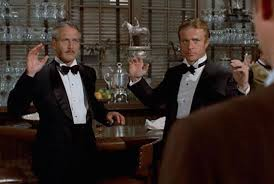 The Sting – they steal from an evil thug who murdered their friend
The Sting – they steal from an evil thug who murdered their friend
 The original Ocean's movie – they steal from a shady casino owner, so they are taking money from a crook who got his money from idiots who voluntarily handed it over to him
The original Ocean's movie – they steal from a shady casino owner, so they are taking money from a crook who got his money from idiots who voluntarily handed it over to him
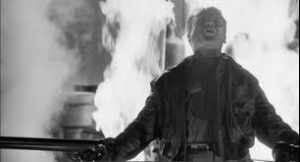 White Heat – Jimmy Cagney's character goes out in a spectacular explosion
White Heat – Jimmy Cagney's character goes out in a spectacular explosion
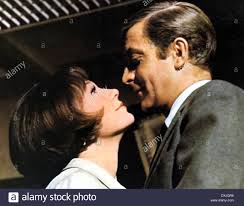 Gambit – Michael Caine's character reforms and gives up his ill gotten gain for the love of Shirley MacLaine's honest woman
Gambit – Michael Caine's character reforms and gives up his ill gotten gain for the love of Shirley MacLaine's honest woman
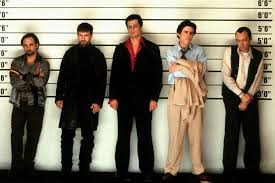 The Usual Suspects – they all die
The Usual Suspects – they all die
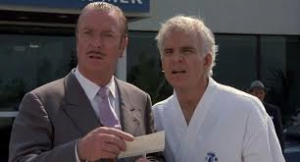 Dirty Rotten Scoundrels – they trade adventure and romance to already corrupted, venal, wealthy, and indulged women for money and jewels, Jamison will not take money from Christine when he finds out she is not rich, AND they are themselves tricked and humiliated
Dirty Rotten Scoundrels – they trade adventure and romance to already corrupted, venal, wealthy, and indulged women for money and jewels, Jamison will not take money from Christine when he finds out she is not rich, AND they are themselves tricked and humiliated
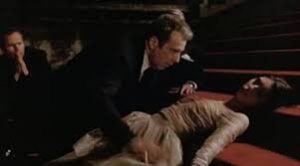 Godfather trilogy – Michael Corleone survives and is financially successful but lives long enough to see his family destroyed and his daughter murdered
Godfather trilogy – Michael Corleone survives and is financially successful but lives long enough to see his family destroyed and his daughter murdered
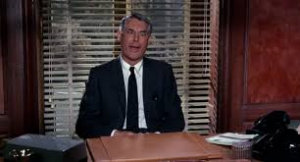 Charade – Cary Grant really isn’t a thief
Charade – Cary Grant really isn’t a thief
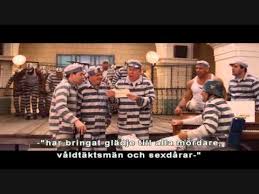 The Producers – Leo and Max are sent to prison EVEN though the victims are old rich ladies to whom Max gave adventure and even appear in court on his behalf
The Producers – Leo and Max are sent to prison EVEN though the victims are old rich ladies to whom Max gave adventure and even appear in court on his behalf
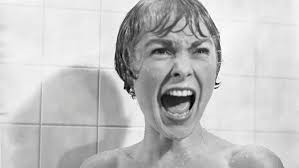 Psycho – well pretty much everybody in the solar system knows what happened to Janet Leigh's embezzling secretary in the shower
Psycho – well pretty much everybody in the solar system knows what happened to Janet Leigh's embezzling secretary in the shower
The point is that most movies respect the unspoken but usually acted upon moral code: Criminals who prey on those undeserving of being made impoverished should endure some kind of equivalent punishment.
Oceans 8 flagrantly violates this rule making the "protagonists" unappealing, unrelatable, and repugnant. Ocean's 8 not only allows the thieves to win but get to whisk away with property stolen from a charity – priceless historic jewelry art pieces which they dismantle to sell in pieces – and catastrophically destroy the lives of perfectly innocent men and women merely doing their jobs: museum curators, security guards, tax payers, not to mention the chilling effect such a robbery would have, not only on the attendance of guests for the next fund raiser, but for the participation of sponsors who would not want their items stolen.
These women, in short, do truly evil acts for trivial and completely selfish reasons……………… and we are supposed to root for them???
When the bad guys get "away" with a scheme it is supposed to be because they are stealing from other bad guys – like in Hell and High Water, OR because the marks are willing participants – as in The Producers. But not in Ocean's 8 where they not only steal from a CHARITY event but get away with it AND only to fund personal trite fantasies of their own. Not even a token amount to a homeless shelter or hospital. Not even a "bone" to the S.P.C.A. (Geddit?..never mind.)
THEN – if this is not bad enough, Sandra Bullock's Debbie's worldview in this movie is very anti-male.
For example,  in one scene Lou asks Debbie why she doesn't want to hire any men. Debbie says it's because men are noticed and women are not and for once she wants to be invisible. If this preposterous and thinly veiled misandristic excuse to even be slightly plausible in the real world, then this very movie wouldn't have been made. Women are very noticeable, occasionally for the wrong reasons, but they're certainly not invisible.
in one scene Lou asks Debbie why she doesn't want to hire any men. Debbie says it's because men are noticed and women are not and for once she wants to be invisible. If this preposterous and thinly veiled misandristic excuse to even be slightly plausible in the real world, then this very movie wouldn't have been made. Women are very noticeable, occasionally for the wrong reasons, but they're certainly not invisible.
In the movie, if this were true, a key plot point would not have been possible.  The entire heist heavily depends upon two highly trained very scary security guards being successfully stopped by a blond wigged German-speaking Debbie blocking their entrance to a woman's bathroom. In the real world there would have at least been one security WOMAN! Even without the part of the scheme where they poison Daphne she would have had to go to the bathroom at SOME point, right? I can't believe a capable security firm guarding a $150 million EXTREMELY portable necklace would have not thought of that. That's just stupid. But even assuming that oversight was made, these two men would have picked Debbie/faux German socialite up and shoved her through the door if necessary, and caught Constance in the act of lifting the necklace. After all, as the movie is written, the switch is not made until later and Daphne walks out of the bathroom without it on and the only other person in there had been Constance. It would have been kind of a no-brainer. Frisking Constance would have then been a simple matter for any trainnie cop much less a trained assassin and a member of the Russian security Force. Had the two security guards not – stopped at the behest of Debbie, and honored the sanctity of the women's bathroom, the Ocean's 8 would have been the Ocean's in prison.
The entire heist heavily depends upon two highly trained very scary security guards being successfully stopped by a blond wigged German-speaking Debbie blocking their entrance to a woman's bathroom. In the real world there would have at least been one security WOMAN! Even without the part of the scheme where they poison Daphne she would have had to go to the bathroom at SOME point, right? I can't believe a capable security firm guarding a $150 million EXTREMELY portable necklace would have not thought of that. That's just stupid. But even assuming that oversight was made, these two men would have picked Debbie/faux German socialite up and shoved her through the door if necessary, and caught Constance in the act of lifting the necklace. After all, as the movie is written, the switch is not made until later and Daphne walks out of the bathroom without it on and the only other person in there had been Constance. It would have been kind of a no-brainer. Frisking Constance would have then been a simple matter for any trainnie cop much less a trained assassin and a member of the Russian security Force. Had the two security guards not – stopped at the behest of Debbie, and honored the sanctity of the women's bathroom, the Ocean's 8 would have been the Ocean's in prison.
On the one hand Debbie claims women are dismissible and in the next moment assumes she will be able to ward off burly and highly motivated security guards with the wave of her hand. Which is it?
Tammy is married in a nice house with two small children. Her husband is never seen but she is observed abandoning her children, literally driving away from her small child who asked if he could go with her.  Engaging in fencing stolen goods out of her garage she claims her husband believes her flimsy excuse that she bought all of the items on e-bay. He must be either complicit or dumb as a bag of hammers.
Engaging in fencing stolen goods out of her garage she claims her husband believes her flimsy excuse that she bought all of the items on e-bay. He must be either complicit or dumb as a bag of hammers.
Debbie is betrayed by the man she loved, Claude, so thinks she is justified in p***ing on a lot of people who had nothing to do with her troubles.
Lou is butch and given a vaguely lesbian personality but, ironically, is the ONLY one of the group who tries to include a qualified man in their group. Her advice is dismissed.
NONE of them, other than the abandoning mother Tammy, have a husband or home or children or any other family of note.
The manager of Cartier is easily swayed into making the unbelievably poor judgement call of lending out a necklace worth $150 million dollars to the moving target of Daphne at an event attended by hundreds of people, all because Rose tells him it will be good for Cartier's image among the young. Forget Debbie's crew. This kind of publicity and $150 million as bait would have attracted Alan Rickman's Hans' crew from Die Hard who, with a couple of stun grenades and some hostage taking could have easily taken control.
Every single one of the men in Ocean's 8 are: stupid, disloyal, greedy, easily manipulated, unreliable or – in a turn of breathtaking hypocrisy on the part of the screenwriter – made invisible.
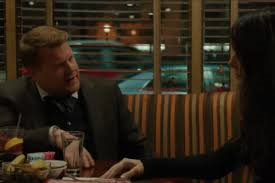 The ONLY capable man in the movie is James Corden's John, an insurance investigator who is on to them immediately. His is the most believable thing in the movie – that a good insurance investigator would have been up their —- assets immediately. Especially since he has a history of catching members of this family. But then he meets with Debbie and agrees to get back ten WHOLE percent of what is left of the necklace in exchange for allowing Debbie to frame Claude,
The ONLY capable man in the movie is James Corden's John, an insurance investigator who is on to them immediately. His is the most believable thing in the movie – that a good insurance investigator would have been up their —- assets immediately. Especially since he has a history of catching members of this family. But then he meets with Debbie and agrees to get back ten WHOLE percent of what is left of the necklace in exchange for allowing Debbie to frame Claude,  who John knows is innocent (at least of this crime). So the only honorable and decent man in the movie is corrupted.
who John knows is innocent (at least of this crime). So the only honorable and decent man in the movie is corrupted.
Is the plot well written? Even for the preposterous Mission Impossible-type scheme that makes up this kind of movie – pretty so-so. There are major plot holes and parts of the plan which depended far too much on luck. There is the warding off the security guys with good looks and an attitude. There is also the point where they "find" the missing necklace in a fountain. This would have been an impossibility to even the casual observer. Daphne did not fall into the fountain or even stop to throw up in it. She raced striaght to the bathroom. 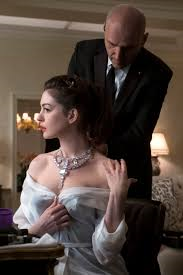 The necklace is secured by a magnetic lock which would have had to have failed to come off her neck or it would have had to go over her head and
The necklace is secured by a magnetic lock which would have had to have failed to come off her neck or it would have had to go over her head and 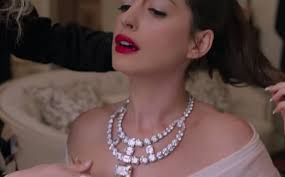 the necklace circumference was far too small for that to be possible. But it is intact when found and security cameras would have shown she was at no time that near the fountain. So how did it get off of Daphne?
the necklace circumference was far too small for that to be possible. But it is intact when found and security cameras would have shown she was at no time that near the fountain. So how did it get off of Daphne?
Is the acting good – given the talent involved – of course.
Is it a lot of fun to watch – yes, if you don’t think long or hard about it while you're watching.
So is it a good movie: No. Absolutely not.
Ocean's 8 is insulting to men in general, to our intelligence and to any sense of morality. While many of these women have, in the past, been in child- and family-friendly movies (Blind Side, Harry Potter, Lord of the Rings), this is not one of them.
You'd be FAR better off spending your time pulling out an old classic like Mad Mad Mad Mad World or Charade or any one of the ones I listed above. Click on the pictures to go straight to Amazon to watch one of them instead of the insulting travesty that is Ocean's 8.


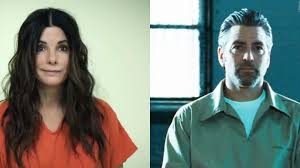
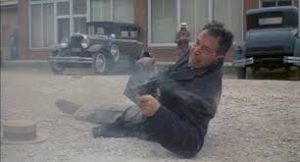



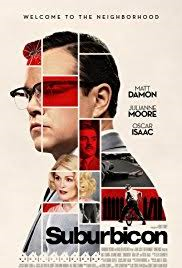


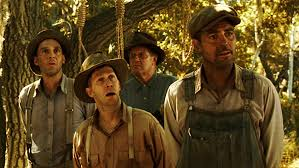 O Brother, Where Art Thou? – decided to film it.
O Brother, Where Art Thou? – decided to film it.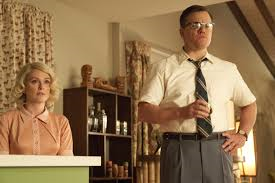 That is – the husband and the deceased wife’s sister are lying and definitely up to no good. Much of this growing tragedy is seen through the eyes of their 12 year old boy Nicky (Noah Jupe).
That is – the husband and the deceased wife’s sister are lying and definitely up to no good. Much of this growing tragedy is seen through the eyes of their 12 year old boy Nicky (Noah Jupe).

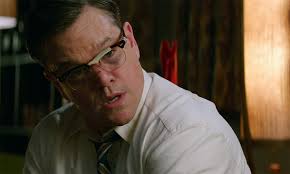 His father has not only failed to protect their family but he has opened the door to permit evil and chaos wreck their will upon their home.
His father has not only failed to protect their family but he has opened the door to permit evil and chaos wreck their will upon their home.  So driven is Lodge by his own mortally self-indulgent passions, that he has tried very little to even pretend sympathy or connection with his son throughout this ordeal. Knowing his son’s suspicions Lodge enters the bathroom where Nicky is bathing – metaphorically and physically vulnerable – to cajole then berate Nicky into agreeing that what he knows – he does NOT know. Then in a later scene he lectures his son on his failings, rationalizing the boy’s grief and suspicions on being undisciplined and coddled by his dead mother. Lodge’s thinly veiled justifications for his own abominable deeds reek of the casual self justifications offered by the Nazis at Nuremberg.
So driven is Lodge by his own mortally self-indulgent passions, that he has tried very little to even pretend sympathy or connection with his son throughout this ordeal. Knowing his son’s suspicions Lodge enters the bathroom where Nicky is bathing – metaphorically and physically vulnerable – to cajole then berate Nicky into agreeing that what he knows – he does NOT know. Then in a later scene he lectures his son on his failings, rationalizing the boy’s grief and suspicions on being undisciplined and coddled by his dead mother. Lodge’s thinly veiled justifications for his own abominable deeds reek of the casual self justifications offered by the Nazis at Nuremberg.